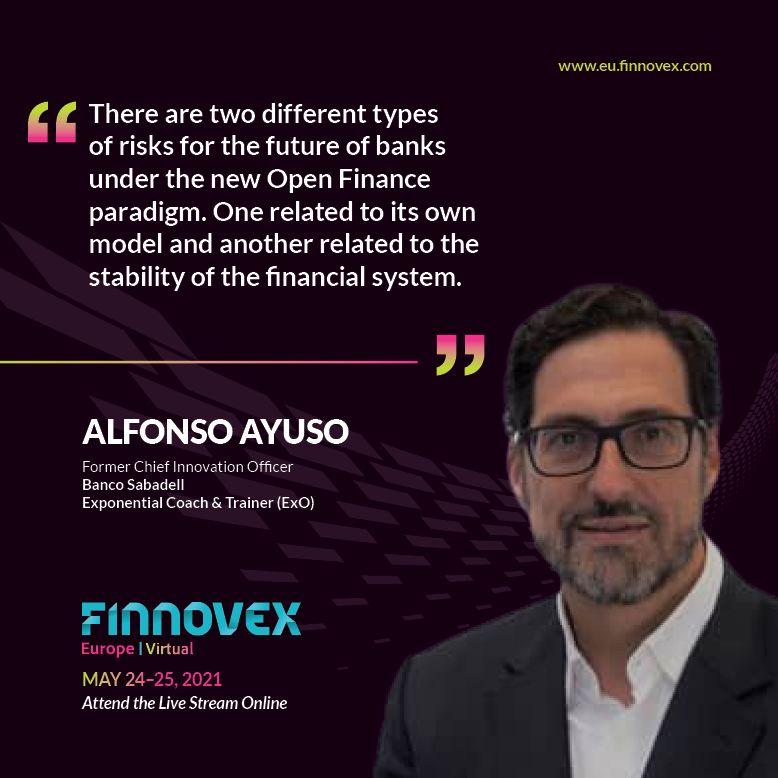Speaker Interview- Alfonso Ayuso
HOME / Speaker Interview- Alfonso Ayuso

Alfonso Ayuso served as the Former Chief Innovation Officer - Banco Sabadell. He is an Exponential Coach & Trainer (ExO)
He has developed his professional career in several banking entities managing positions of responsibility in areas related to technology, financial markets, product development and relationship with clients, such as Treasury and Capital Markets, Private Banking or Research.
He holds a degree in Aeronautical Engineer from the Polytechnic University of Madrid and an MBA from the IE Business School.
Likewise, he is a very active member of Spanish sectorial working groups belonging to the Spanish Banking Association and acting as member of the board in several organizations like Alastria Blockchain Consortium, Redsys or Iberpay, among others.
MR Alfunso Ayuso will be speaking virtually at the Finnovex Europe Summit. Please have a look at his view on our upcoming Leading Summit on Financial Services Innovation and Excellence held Virtually on 24th – 25th May 2021 ( Attend from anywhere 💻🖥📱 )
Q- In your opinion, what do you think about the current Open Finance paradigm shift within the European region?
We are at the beginning of a new playing field in which the scenario is definitely opened to the participation of large platforms that will have to react to the regulatory environment that lies ahead. According to the Digital Markets Act, business users and end users could port that data in real time effectively, such as for example through high quality application programming interfaces. We are directly entering the next phase of OpenData.
Q- As it relates to Financial data, can you identify the challenges that hinders the Open Finance process?
Starting from the premise that data will be accessible in real time in a machine-readable format through APIs, the main challenges that the industry will face will be those related to accessing and processing data in a standardized way. The implementation of PSD2 has already surfaced the complexities to build an industry standard as it is not established by regulation or there is no single entity in charge of defining them. Important coordination will be required by the intervening parties or players who take the initiative in the process.
Q- Based on your wealth of experience, can you pinpoint the opportunities available for building a more efficient and productive financial system within the European Region?
In this new scenario, the relationship with the customer takes on a new dimension and the manufacture of products, which will become commodities, takes a back seat. The battle will be fought in the design of services that meet the needs of customers regardless of the product that is finally used to transport it. The coverage of the applications of some entities so that they can be used by non-clients is a sign that the path is beginning towards the commercialization of financial products on open platforms at scale.
Q- Can you tell us the risks for the future of banks that can be as a result of the impact of the technological revolution and its far-reaching changes in the global economy and society at large?
There are two different types of risks for the future of banks under the new Open Finance paradigm. One related to its own model and another related to the stability of the financial system. In the first place, banks will have to structure themselves to work as a platform or they will run the risk of becoming mere product manufacturers with no relation to the end customer. Secondly, most of the new models that are being developed under the PSD2 regulatory framework are designed to provide transactional business models, especially in the payments sector, with lower regulatory burdens that can cause a transfer of funds from bank deposits, that finance the economy, to payment accounts that cannot be used to be borrowed, which could stress the current banking model itself.
Q-What advice would you like to share with industry peers and banking professionals who are looking forward to attending this conference?
Many times, I have answered this question and I always come to the same conclusion. Banking professionals have always thought linearly, with annual projections based on linear increments, but the current world of the fourth industrial revolution is unfolding exponentially and when the sector suffers the disruption that the combination of OpenFinance and OpenData will cause, those who do not have changed course of thinking from product thinking to necessity thinking will disappear from the scene.